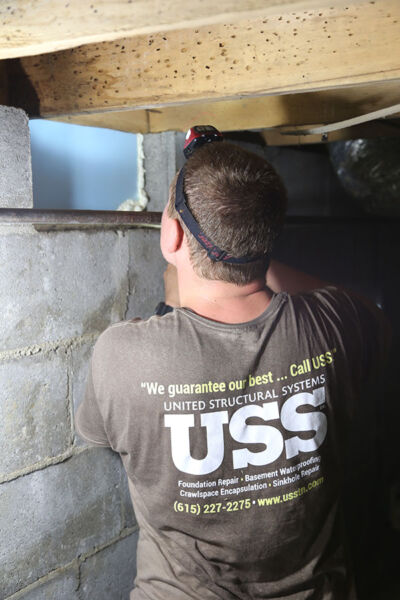USS of Nashville can help you remove mold from your crawl space that is allergenic. It’s allergy season—time for sneezes and itchy eyes to shine. Reaching for antihistamines or essential oils for relief is a common solution to get you through spring; but identifying the root cause of hay fever and other allergy-related sicknesses is the best way to fight seasonal allergies and avoid getting stuck just treating the symptoms. Not all spring allergies develop because of things in bloom. If you know someone who rarely goes outside and still suffers from coughs and sniffles, allergy triggers may lie within the home. One popular hiding spot for allergens, such as indoor mold spores and dust mites, is the crawl space. Keeping these indoor allergens at a minimum can be difficult when your crawl space is unencapsulated. In this article we focus on the crawl space as a source of allergy triggers and answer three questions about crawl space encapsulation:
- How does encapsulating a crawl space help allergies?
- What is the difference between a vapor barrier and encapsulation?
- Can you encapsulate a basement?
If your crawl space is damp and humid—typical for an unencapsulated crawl space—it is likely already host to a variety of mold and mildew. A humid environment promotes organic growth, including fungus and bacteria, and is a breeding ground for other microscopic pests. Because the home naturally ventilates the air from your crawl space into the living areas, homeowners are susceptible to breathing in these airborne pollutants. With an unencapsulated crawl space, you lack reliable protection against these and other indoor allergens.
40% of the indoor air you breathe comes from the crawl space, according to energy experts of the WSU Energy Program. The stack effect, or uncontrolled movement of air in and out of small holes and cracks in the home’s interior, occurs when warm air moves upward in the house. Entry through holes for cable cords, air registers, and even recessed lighting are just a few avenues of how crawl space air makes its way into your home. This helps explain how allergy sufferers who spend most of their springtime indoors can experience aggravated allergies by breathing in pollutants from the crawl space. Homeowners frequently encounter airborne mold spores and dust mites when the undisturbed air of the crawl space suddenly flows through the home after the winter months. Because aggravated allergies, asthmatic symptoms, and other potential respiratory issues can become serious, correcting an unhealthy, allergen-filled crawl space with encapsulation should be a priority for allergy sufferers.

On average the air in the American home is more polluted than outdoor air according to the EPA. You can improve the air quality in your home and help prevent allergens from migrating into your living space with crawl space encapsulation. By sealing off the crawl space floor and crawl space walls with encapsulation, you decrease the amount of moisture allowed to enter the crawl space. This, in turn, reduces the amount of water vapor in the air relative to the temperature beneath the house. Lowering the humidity level in a crawl space that stays moist and damp will diminish the amount of organic growth in the crawl space, preventing mold spores, dust mites, and other living matter from aggravating allergies and worsening health problems. Essentially, it is as vital to monitor the health of your crawl space as it is the air quality indoors. When there is cleaner air in the crawl space, there is cleaner air in your home.
Crawl space encapsulation is a service provided by a foundation repair company that protects the crawl space from excessive moisture utilizing a thick, plastic material that many homeowners call a vapor barrier. However, crawl space encapsulation and vapor barrier installation have distinct differences:
Vapor Barrier
- Typically 6mil plastic material
- Placed directly on the ground floor (not sealed)
- Creates (an unsealed) barrier between the dirt floor and crawl space air
- Sometimes has a one-year warranty
Encapsulation
- Utilizes thicker 12+mil plastic material
- Backed with drainage matting
- Seals off the ground floor
- Seals off crawl space walls backed with protective wall board
- Uses spray foam and encapsulation tape to seal remaining areas
- Reduces moisture & humidity levels
- Backed by a lifetime warranty
- Paired with a dehumidifier for best results

Installing a vapor barrier in the crawl space and encapsulating a crawl space are not the same thing. A vapor barrier is simply a sheet of plastic placed on the dirt floor of a crawl space to create a barrier between the ground and the crawl space air. Neither a vapor barrier nor encapsulation are methods of waterproofing a crawl space, though they do supplement interior drain systems designed for that function. A crawl space encapsulation is designed to prevent moisture from accumulating in a crawl space and helps reduce the humidity level beneath your house. Preventing excessive moisture protects the structural integrity of your home by keeping the wood beneath the house dry, less prone to wood rot, unattractive to wood-hungry pests, and more resistant to organic growth. Installed properly, crawl space
Picture: Drainage matting beneath crawl space encapsulation material.

Encapsulation is most effective when combined with adequate sealants and a dehumidifier. A vapor barrier does not reduce humidity or waterproof and is solely designed to cover the ground surface in the crawl space. However inaccurate, accepted terminology today coins vapor barrier as both a waterproofing method and as an encapsulation product. Be sure to ask detailed questions when seeking out encapsulation for your crawl space to verify that the product you are considering meets your expectations.
 Encapsulation is meant for the crawl space—an area of unoccupied, unfinished, limited height between the earth and first ground floor—usually a space with only enough room to crawl, not stand. Because basements are usually full height and used as living and storage spaces, a basement encapsulation is impractical. To effectively encapsulate an area, seal it off from moisture, and reduce humidity levels, the windows and air vents also need to be sealed. For a basement, this is obviously not ideal. Interior drain systems are best for basement waterproofing solutions, not encapsulation. Yet, culture has redefined another term in the home repair industry. Wikipedia says your space can be defined as a basement if your crawl space is taller than 3ft. So, despite the combination of the two words basement encapsulation being essentially impractical, if the area you call your basement is uninhabitable, does not have room to stand, or has a dirt floor (aka crawl space), your basement defined this way may be a candidate for encapsulation.
Encapsulation is meant for the crawl space—an area of unoccupied, unfinished, limited height between the earth and first ground floor—usually a space with only enough room to crawl, not stand. Because basements are usually full height and used as living and storage spaces, a basement encapsulation is impractical. To effectively encapsulate an area, seal it off from moisture, and reduce humidity levels, the windows and air vents also need to be sealed. For a basement, this is obviously not ideal. Interior drain systems are best for basement waterproofing solutions, not encapsulation. Yet, culture has redefined another term in the home repair industry. Wikipedia says your space can be defined as a basement if your crawl space is taller than 3ft. So, despite the combination of the two words basement encapsulation being essentially impractical, if the area you call your basement is uninhabitable, does not have room to stand, or has a dirt floor (aka crawl space), your basement defined this way may be a candidate for encapsulation.
If your crawl space needs encapsulation, now is the best time for an encapsulation installation before the humidity levels rise and you begin to see additional structural effects on your home. If you want to remove allergens from your home in Nashville or have moisture issues or excessive humidity in the basement, consider waterproofing the basement with an interior drain system. Crawl space encapsulation, or basement encapsulation if you are referring to an underground space that has never been and never will be a livable space, is the best solution for decreasing humidity, improving air quality, and reducing moisture beneath your home. Give your allergies a break this season and prevent indoor allergens from making their way into your home. Enjoy the additional benefits of encapsulating your crawl space by giving USS a call today!


